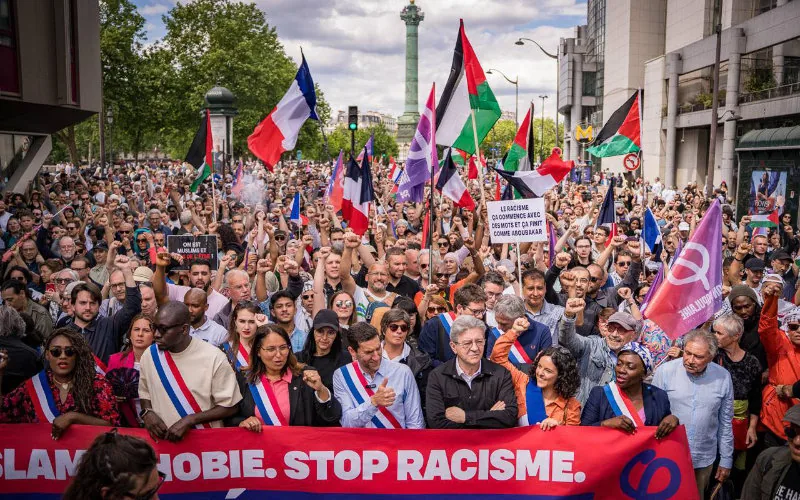French Muslims Fear Rising Islamophobia After Fatal Mosque Stabbing

Since April 25th, Muslims in France have been living in fear. On that date, suspect Olivier H. fatally stabbed Aboubakar Cissé, a 22-year-old Malian, in a mosque in Gard.
Aboubakar Cissé was stabbed multiple times by the suspect on April 25th, while he was praying in the mosque of La Grand-Combe, in Gard. The young Malian has just been buried in his country of origin. "There is a lot of sadness but very little surprise. We feel the pressure that has been building for months. We see all the mosques that are vandalized everywhere in the country and the fear. I am an optimistic man but looking ahead, I tell myself that we are not safe from the worst," confides Hafid to Libération, a retired Muslim, in charge with "others" of security, administration and maintenance of a small mosque in Seine-Saint-Denis.
On Sunday, a march was organized in Paris and throughout France, in tribute to the Malian. In a statement released Friday, the Nîmes prosecutor’s office announced the indictment and incarceration of the main suspect, Olivier H, a 20-year-old Frenchman. He was arrested in Italy and transferred to France, then charged with "murder due to religion." Hafid is concerned about the rise of violence against Muslims. "[...] Today, Muslims are targeted, not to mention Arabs and Blacks... Violence is rising and politicians are not taking the attacks seriously," he fumes.
Islamophobia is taking on alarming proportions in France and fear is increasingly gripping the hearts of the country’s Muslims. Last year, 173 anti-Muslim incidents were recorded, according to data from the Ministry of the Interior. "We feel a difference. The reactions are not the same after an attack on a church or a synagogue. We’re not asking for special treatment but equality. The country must support and defend all victims in the same way," protests Djamel, a thirty-something IT professional in Nancy.
"Sometimes on the RER or in Paris, I come across bad looks, but I look away. Other people’s judgment doesn’t bother me. What worries me is physical. I tell myself that I could get beaten up coming home one evening," fears Aïssatou, 25, a veiled student in her third year of law in Paris. The young woman recounts that one of her friends, also veiled, was the victim of an assault in winter. A lady tried to tear off her veil on the bus. Lotfi and Amine, two social workers, are exasperated: "Aboubakar’s death brought everything back up. We saw, we heard stories. Vandalized mosques, assaults and everything but it passed. This time it’s too much."
This rise in Islamophobia has pushed many Muslims to leave France to settle in London, Dubai, New York, Casablanca or Montreal. In a book titled "France, you love it, but you leave it," published by Seuil, three sociologists Olivier Esteves, Alice Picard and Julien Talpin explain the reasons for this situation. The book is the result of a survey conducted in April 2024 on a sample of over 1,000 people who cite discrimination, stigmatization and integration difficulties as reasons for their exile. "The unease is deep among Muslims and has never been so great," said Tareq Oubrou, the rector of the grand mosque of Bordeaux, during the book’s release.
Related Articles
-

Paris Restaurant Caves to Pressure, Removes Israeli Wines Amid BDS Campaign
1 September 2025
-

French-Algerian Tensions Escalate: Media War and Political Backlash Reignite Diplomatic Crisis
30 August 2025
-

Date Pit Espresso: The Ancient, Caffeine-Free Coffee Alternative Taking France by Storm
30 August 2025
-

Influencer Poupette Kenza Resurfaces: From Prison to YouTube Comeback After Extortion Scandal
30 August 2025
-

Nightmare at 30,000 Feet: EasyJet Flight Diverted, Passengers Forced to Sleep on Airport Floor
30 August 2025